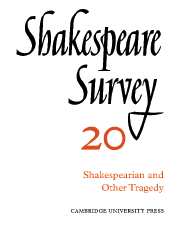Book contents
- Frontmatter
- Shakespeare, Fletcher and Baroque Tragedy
- Seneca and the Elizabethans: A Case-study in ‘Influence’
- George Chapman: Tragedy and the Providential View of History
- Critical Disagreement about Oedipus and Hamlet
- Shakespeare’s Thematic Modes of Speech: ‘Richard II’ to ‘Henry V’
- Anarchy and Order in ‘Richard III’ and ‘King John’
- The Staging of Parody and Parallels in ‘I Henry IV’
- Shakespeare’s Unnecessary Characters
- Walter Whiter’s Notes on Shakespeare
- Shakespeare’s ‘Romeo and Juliet’: Its Spanish Source
- The Grieves Shakespearian Scene Designs
- Shakespeare on the Modern Stage: Past Significance and Present Meaning
- Shakespeare in Brazil
- Recent Shakespeare Performances in Romania
- Shakespeare, the Twentieth Century and ‘Behaviourism’
- The Year's Contributions to Shakespearian Study 1 Critical Studies
- 2 Shakespeare’s Life, Times and Stage
- 3 Textual Studies
- Index
- Plate section
Shakespeare, Fletcher and Baroque Tragedy
Published online by Cambridge University Press: 28 March 2007
- Frontmatter
- Shakespeare, Fletcher and Baroque Tragedy
- Seneca and the Elizabethans: A Case-study in ‘Influence’
- George Chapman: Tragedy and the Providential View of History
- Critical Disagreement about Oedipus and Hamlet
- Shakespeare’s Thematic Modes of Speech: ‘Richard II’ to ‘Henry V’
- Anarchy and Order in ‘Richard III’ and ‘King John’
- The Staging of Parody and Parallels in ‘I Henry IV’
- Shakespeare’s Unnecessary Characters
- Walter Whiter’s Notes on Shakespeare
- Shakespeare’s ‘Romeo and Juliet’: Its Spanish Source
- The Grieves Shakespearian Scene Designs
- Shakespeare on the Modern Stage: Past Significance and Present Meaning
- Shakespeare in Brazil
- Recent Shakespeare Performances in Romania
- Shakespeare, the Twentieth Century and ‘Behaviourism’
- The Year's Contributions to Shakespearian Study 1 Critical Studies
- 2 Shakespeare’s Life, Times and Stage
- 3 Textual Studies
- Index
- Plate section
Summary
The supremacy of Shakespearian tragedy is no doubt unchallenged and unchallengeable, though it may be that its superiority to other types lies more in the man than in the actual type, and that if the type had been represented only by Marlowe, Chapman and the rest its position would be less assured. The purpose of this paper, however, is not to discuss questions of value, though I believe that the later seventeenth-century type of tragedy, which begins with Fletcher and in England reaches its fullest growth with Dryden, suffers rather unfairly in critical opinion from being regarded, especially in its earlier stages, too much as a degenerate descendant of a great model rather than an attempt to evolve something answering to the needs of a different age, with a different vision and climate of opinion. The paper is much more an attempt to point out some of the more essential differences between the two types which may help us to see better where Shakespeare’s strength does chiefly lie. It may seem strange that I should choose to demonstrate the later type mainly on Fletcher, who after all has only two not very outstanding tragedies to his name—for I do not believe that he had much to do with the planning of the Beaumont tragedies. But most of what I say applies to his tragi-comedies too. And for me the peculiar interest of Fletcher lies in the fact that he does represent the gateway to seventeenth-century tragedy, or what I should call the Baroque type in its essentials and without the neo-classical accidentals that loom so large with Dryden and his fellows, as also with the French classicists.
- Type
- Chapter
- Information
- Shakespeare Survey , pp. 1 - 16Publisher: Cambridge University PressPrint publication year: 1967



